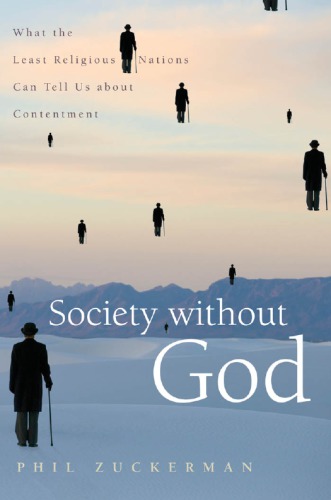
Society without God
What the Least Religious Nations Can Tell Us About Contentment
کتاب های مرتبط
- اطلاعات
- نقد و بررسی
- دیدگاه کاربران
نقد و بررسی

August 11, 2008
Sociologist Zuckerman spent a year in Scandinavia seeking to understand how Denmark and Sweden became “probably the least religious countries in the world, and possibly in the history of the world.” While many people, especially Christian conservatives, argue that godless societies devolve into lawlessness and immorality, Denmark and Sweden enjoy strong economies, low crime rates, high standards of living and social equality. Zuckerman interviewed 150 Danes and Swedes, and extended transcripts from some of those interviews provide the book's most interesting and revealing moments. What emerges is a portrait of a people unconcerned and even incurious about questions of faith, God and life's meaning. Zuckerman ventures to answer why Scandinavians remain irreligious—e.g., the religious monopoly of state-subsidized churches, the preponderance of working women and the security of a stable society—but academics may find this discussion a tad thin. Zuckerman also fails to answer the question of contentment his subtitle speaks to. Still, for those interested in the burgeoning field of secular studies—or for those curious about a world much different from the devout U.S.—this book will offer some compelling reading.

September 1, 2008
In an anecdotal and eminently readable manner, Zuckerman (sociology, Pitzer Coll.) offers a novel idea within the study of religious sociology. Specifically, he investigates what it means to be a nonbelieving person in a pervasively secular society. Zuckerman offers personal reflections and sociological analysis of two of the least religious countries in the world today: Denmark and Sweden. His yearlong study consisted of 150 formal interviews of people from all vocations and areas of these countries. Through these findings, Zuckerman attempts to analyze the answers that a relatively nonreligious society offers for dealing with death, considering deep philosophical questions, and creating personal contentment. Unfortunately, he offers much more personal reflection than sociological analysis, and his study does not include controls for statistical (rather than haphazard) sampling to produce accurate representation of these societies. As a result, this book is an interesting conversation starter, but it has little sociological value. Optional for libraries with large religious sociology collections.Dann Wigner, Wayland Baptist Univ. Lib., Plainview, TX
Copyright 2008 Library Journal, LLC Used with permission.

























دیدگاه کاربران